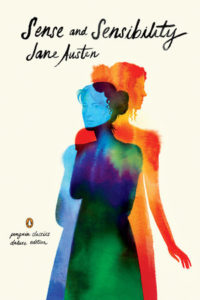
Sense or Sensibility... What if Jane Austen Had to Choose?
Devoney Looser Considers the Mind vs. the Heart
How do you know if you will love Sense and Sensibility? What if it doesn’t happen to you? First-time readers of Austen’s fiction, knowing its reputation for literary greatness, may approach this novel with Marianne-like expectations. You want to be bowled over, to find charms in every sentence, or to discover that all the novel’s beauties are entirely shared on a first reading. It could happen to you. There are certainly those who love the book in ways that might seem imprudent or excessive.
Readers who love Sense and Sensibility in its original form are rarely describing their first encounters with the book. Instead, they’re describing what it means to read and reread it or to revisit it through film, television, and stage. These devoted readers have developed, rather than discovered, a Marianne-like inability to love the novel by halves while internalizing Elinor’s more measured approach to its prose. To love Sense and Sensibility—if you seek to—it’s crucial to enter its pages with gusto, as well as with deliberative care.
You may come to this novel already knowing the rough outline of the plot, having seen a recent popular film or stage version. Whether or not you’re reading the novel knowing how it all turns out, you may find the language challenging. If you read this book more slowly, you’ll be more likely to notice the way its language and its themes come together, as well as to appreciate its understated, wry comedy. It’s both a profoundly serious and an amusingly comic novel.
Look, for instance, at how the novel introduces Elinor and Marianne’s elder half-brother, John Dashwood, in the first chapter: “He was not an ill-disposed young man, unless to be rather cold hearted, and rather selfish, is to be ill-disposed.” Reading just the first phrase, you’d expect that what follows the comma would be a compliment. To be “ill-disposed” is to be someone disposed to do ill—to be a bad person. But what follows the clause telling us that John is not a bad young man is another double negative. He’s not bad, unless we think being coldhearted and selfish make a person bad—as, of course, we should!
At its core, Sense and Sensibility deals with how individuals make meaningful lives in a world that is often deeply unfair.
The way Austen backs us into that assessment of John is not just clever. It’s funny. It’s designed to make us think about how community determines a man’s respectability. By all outward appearances, he’s a “good man.” At the same time, his impulses and feelings are atrocious. To make matters worse, he’s married to a woman who brings out his worst coldhearted, selfish qualities. Together, John and Fanny’s actions (and inactions) produce real evils.
That sly, double-negative, ironic approach to storytelling means the novel’s lessons are often opaque. Austen’s fiction asks readers to consider truths and half-truths, omissions and lies, and generosity and greed. At its core, Sense and Sensibility deals with how individuals make meaningful lives in a world that is often deeply unfair. Its questions are set out by differences in its two sister-heroines’ opinions and styles.
The story also shows how the sisters have an impact on each other’s evolving judgments. Marianne’s lines that she “requires so much” in a man might be seen through Elinor’s eyes. Elinor would surely substitute the word “too” for Marianne’s “so.” Which one of them gets it closer to right, in the world of the novel or beyond it? Perhaps, in love, so much is too much. But perhaps setting one’s sights on so much leads to opportunities for so much more.
*
Readers ought to channel their inner Elinors, as well as their inner Mariannes, to read Sense and Sensibility with greater sense and sensibility. We ought to pause to define these terms, because the words have changed in meaning over the past two centuries. The title’s two nouns are neither synonyms nor antonyms. The meaning of “sense” then was close to what it means in our day—rationality, wisdom, reasonableness. It suggested having well-regulated powers of mind. But “sensibility” in the Romantic era (the late 18th and early 19th centuries) had nothing to do with being sensible or wise. Sensibility signaled emotional sensitivity, sympathy, and susceptibility. It was a power of the senses, of perception or taste, and of the heart. To claim to feel more deeply, or to express stronger feelings, was a very fashionable form of sensibility. Dozens of studies have been published on what’s called the era’s cult of sensibility. Janet Todd’s Sensibility: An Introduction (1986) remains one of the best places to begin.
Histories of sensibility in literature often start with Laurence Sterne’s novel A Sentimental Journey through France and Italy (1768), Henry Mackenzie’s The Man of Feeling (1771), or Johann Wolfgang von Goethe’s The Sorrows of Young Werther (1774). It seems audiences encountered these novels in order to experience and share the powerful feelings that the stories called up. Whether these books were devoured in contemplative solitude or read aloud among family or friends, the point was to be so moved as to shed tears. Both men and women were invited to cry with these male characters, but over time, the concept of sensibility became further divided by gender. Men might cultivate admirable sensibility, but women were widely believed to have greater natural or biological access to it. The ramifications of these stereotypes about gender, thinking, and feeling still linger with us.
Sensibility was also a politically controversial concept. Some then argued that more “refined” (or higher-class) people had greater taste, sensitivity, and sensibility. Sensibility could be used to sort out the well-born from the low-born or the well-educated from the uneducated. Whether learned or inborn, the moral qualities of a privileged person were said to heighten his or her ability to recognize and respond to beauty.
Others, however, believed just the opposite. If sensibility were truly about sympathy, then anyone could claim to have it. It could be found in all walks of life. Indeed, recognizing sensibility in all sensitive people—regardless of class, race, gender, or nation—could also prove one’s own worth. If a privileged person could show sympathy for the plight of the sensitive downtrodden and wanted to better the lot of those who shared his fine sensibility, then he could claim to be a superior moral person. The problem, of course, was that sensibility could be feigned. Many sounded alarms about the dangers of false sensibility, too.
Austen’s fiction suggests that she had definite opinions about, and a healthy skepticism toward, fashionable sensibility. Her distrust of the excesses of sympathy is made especially clear in one humorous conversation in the novel. While walking on a beautiful fall afternoon, Elinor teases Marianne, “It is not every one who has your passion for dead leaves.” It’s both a throwaway joke and an implicit criticism. Do dead leaves deserve sympathy? Are there other things that deserve our passionate concern more than dead leaves?
Elinor’s snarky line implies that Marianne’s powerful feelings may be more excessive and indiscriminate than admirable. But Marianne shoots back at her, with seriousness and self-assurance, “No; my feelings are not often shared, not often understood. But sometimes they are.” Marianne defends the idea that anyone with her kind of fine sensibility is a superior person. To love dead leaves is to show an exquisite appreciation of nature, beauty, and life, from cradle to grave. Elinor’s response suggests she thinks that loving dead leaves is not a sure sign of anything admirable about a person. She would seem to prefer to evaluate people on their intentions, judgments, and behavior rather than on their heightened sensitivities, dramatic empathy, or professed taste.
Sensibility could be used to sort out the well-born from the low-born or the well-educated from the uneducated.
The sisters’ disagreements over feelings and dead leaves point not just to their individual differences but to their family problems. Marianne follows in the emotional footsteps of her mother, with little regard for moderating her responses. Elinor serves not only as Marianne’s adviser but as her own mother’s counselor. To make matters worse, young Margaret is said to have Marianne’s romantic turn without her sense. (It’s important to note the implication in this line that Marianne, too, has sense.) Elinor’s worries for her mother and sisters are hardly selfish, but they are informed by her own self-interest. She must realize that the choices of one of them could affect all of them. One sister’s damaged reputation, outlandish behavior, or unconventional choices could have an impact on the marriage prospects of the rest. That fact ought to make any female character from this period who worries about finding love—for herself or others—appear the furthest thing from a frivolous person.
This was a culture in deep conflict about the roles of love and money in marriage. Public debates were still being staged in the 1790s, asking whether it was a greater evil to marry for love without money or to marry for money without love. As one satirical source put it, love without money is “like a Hive without Honey.” Another jibed, “If truth may be spoke / ’Tis but a mere joke, / For love without money / Will vanish like smoke.” Works of fiction usually privileged the love side of the equation. Money would miraculously fall into place by story’s end. Marianne’s ideal man is a figure ripped out of the pages of the day’s improbable novels. Like her fictional heroine, Austen must have considered long and hard what a worthy hero ought to look like in a work of realistic fiction. It was a literary problem, too.
*
To understand where Marianne’s perfect hero comes from, we might compare him to one from a bestselling novel in Austen’s day. Jane Porter’s The Scottish Chiefs (1810) uses as its hero the 13th-century warrior William Wallace. He’s described as having
married Marion Braidfoot the beautiful heiress of Lammington. Of the same age, and brought up from childhood together, reciprocal affection grew with their growth; and sympathy of taste, virtues, and mutual tenderness, made them so entirely one, that when at the age of twenty-two the enraptured lover was allowed . . . to pledge that faith publicly at the altar which he had so often vowed to his Marion in secret, he clasped her to his heart, and softly whispered,—“dearer than life! part of my being now and forever! blessed is this union, that mingles thy soul with mine to all eternity!”
Marianne Dashwood clearly wants a Wallace. She looks for entire sympathy of taste and virtues, a two-making-one, a soul mingling. Her man of great feeling delivers his poetic lines of love in tender whispers, with breathy exclamation points.
Marianne also thinks true love happens just once, doubting the heart’s ability to love fully a second time or more. It’s an odd belief for someone who is herself the product of a happy second marriage, as Elinor points out. But their tussle over this question is in keeping with the rest of the novel, because Sense and Sensibility repeatedly asks how its characters, and we, are supposed to place a value on what’s first, second, and even third. It explores not just first and second loves but first-, second-, or third-born children and first, second, and third generations. Siblings in the novel come in distinct pairs and triples. Names double up. The novel asks us to measure, compare, and contrast in ones, twos, or threes. Firsts are often prioritized, but we’re repeatedly prompted to ask whether first is really best.
Although Sense and Sensibility was probably the second full-length novel that Jane Austen began to write (and likely the third she “finished”), it was the one she published first. Begun, according to family legend, as an epistolary novel—a novel told in letters—in the late 1790s, the novel that became Sense and Sensibility would stake Austen’s literary claim. Her first readers had no way of knowing that, because she published it anonymously. She used the phrase “By a Lady,” instead of her name, on the book’s title page. She concealed her identity, but not her gender, from the public.
There remains a great deal of misunderstanding and myth about that move. It was neither an oddity nor a female requirement. Anonymity appears to have been a majority choice among all fiction writers in the period, male and female. More than 60 percent of novels published in the late 18th and early 19th centuries were not signed on their title pages. Even the authors who would become the most famous among these novelists—Sir Walter Scott, Maria Edgeworth, Frances Burney, and Mary Shelley—all published their fiction anonymously at first.
They only later signed their real names to their works. It would seem they waited to see whether their books would attract positive notice and fame before revealing their authorship. We tend to assume that Austen, had she lived, would always have preferred anonymity. These examples suggest another possible path. We don’t know what Austen would have chosen to reveal about her authorship had she lived a longer life. We don’t know what she might have chosen to do had she witnessed, as these other authors did, that her novels continued to attract positive attention.
Marianne also thinks true love happens just once, doubting the heart’s ability to love fully a second time or more.
Women writers were responsible for about half of the approximately 1,500 works of prose fiction published in Britain in the first two decades of the 19th century. That makes the novel of the time an equal opportunity genre, by the numbers at least. (Women were not so well represented in other genres, which surely made the novel seem more female-dominated by comparison.) As an author, Austen could have chosen to mask her gender, but she must have wanted to be identified as female. What we’ve been slow to notice is that, in making the choice for “By a Lady,” she was out of step with her contemporaries. There was a major explosion of “By a Lady” novels in the 1780s, when Austen was a little girl. Almost a quarter of the novels published in 1785 were signed that way. By the late 1790s, however, when Austen may have first started drafting Elinor and Marianne (the title she’s said to have first given the story that became Sense and Sensibility), the number of novels signed “By a Lady” dropped to just 5 percent. After 1800, it is said to have dwindled to a thin trickle.
That means Austen’s “By a Lady” signature was an out-of-fashion outlier in 1811. Was she deliberately marking herself out, not only by gender but with an antiquated or nostalgic phrase? It’s possible. It’s also possible that she was following a family-author tradition. Her cousin Cassandra Cooke—who was also her godfather’s wife—published her Battleridge: An Historical Tale, Founded on Facts (1799), anonymously as “By a Lady of Quality.” Austen, in choosing to go with “By a Lady” but omitting Cooke’s further class marker (“of quality”), might be said to have chosen a less aggrandizing, yet still polite, way of describing herself. Perhaps Austen was both echoing and bucking family tradition in referring to herself in print this way.
What’s notable is that Austen would directly identify as a “Lady” author on a title page only once. She published Pride and Prejudice (1813) as “By the Author of Sense and Sensibility.” Mansfield Park (1814) was published as by the author of Sense and Sensibility and Pride and Prejudice, still giving her first novel pride of place on the list. Either Austen or her publishers—or both—wanted readers to be able to track her authorship. Her second novel was attached to her first by its name. In linking Sense and Sensibility to Pride and Prejudice, on her second novel’s title page, Austen was creating her own literary brand, as we might put it today.
__________________________________

From Sense and Sensibility (Penguin Classics Deluxe Edition). Used with the permission of Penguin Classics. Introduction copyright © 2018 by Devoney Looser.
Devoney Looser
Devoney Looser, Regents Professor of English at Arizona State University, is author or editor of twelve books, most recently Wild for Austen: A Rebellious, Subversive, and Untamed Jane . Her previous books include Sister Novelists (2022) and The Making of Jane Austen (2017). Looser has published essays in The Atlantic, New York Times, Salon, Slate, The TLS, and the Washington Post, and her series of 24 30-minute lectures on Austen is available through The Great Courses and Audible. She is a life member of the Jane Austen Society of North America and has played roller derby under the name Stone Cold Jane Austen.












